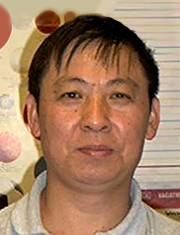While Guangli worked for 25 years in several different positions in China, in the more than four years of residence in the U.S., he had not been employed. From Guangli's 2006 interview, we see that for Guangli, like for many immigrants, an obstacle to his working in the U.S. is his English language proficiency. In the interview, when asked about a job, he tells the interviewer that he wants to study English more before trying to get a job. The interviewer has interviewed Guangli three times previously. He is a native speaker of Mandarin and a professional English teacher in the U.S. He knows Guangli's life fairly well and suggests working and studying at the same time. Below is part of that exchange:
| I: | What is your work status? | |
| Guangli: | I have not worked up to now. It is because I want to practice my English first at this moment. As I worked in the field of interior decoration in China, I believe that it won't be hard to get a job here. | |
| I: | … if we work and study at the same time, we can learn from work. So the process of learning English will be faster. Some students learn from mistakes. They feel that if they work and learn English at the same time, they can learn English much faster. So, you might think about this suggestion. | |
| Guangli: | Yes, I am considering this. Now, I am at the stage of not being afraid of speaking English. I can talk with others and I learn a lot through studying English. It is because I had the same situation in China. At first, I did not know how to run this field, and then, I learned from those mistakes and absorbed experiences. Once I got more familiar with it, it became more natural. | |
| Hide Conversation | ||
Guangli mentions that after four years he is starting to overcome the fear of using English. Mentioning a fear of using English is especially important considering his understanding of the importance of social interaction for language learning.
Like other students in our project (Inez, Valerio) the downgraded work status from his country origin to that in the U.S. was disconcerting to Guangli. This exchange from his 2006 interview (in Mandarin) illustrates this.
| Guangli: | So, it is very hard. In China, I had a business. I purchased the material for construction projects. After the construction was done, I needed to give salary to the workers. I taught them how to work and collect payments. There are a lot of things I needed to take care of. After I came here, I had nothing to do. It seemed wasteful. In China, I took care of a lot of issues and I spoke a lot. After coming here, I couldn't talk. How much could I talk to my child? I could not talk much with him. In the past, I worked on organizing over 100 different kinds of material. I needed to handle workers and their salaries, too. I needed to take care of it. It is not like in America where after you finish a construction project you get the money. China has a different method. I had to think about how to collect payments for the workers in China. I also needed to think about how to construct new projects. …I also felt that I was too busy in China. | |
| I: | It is because you had a higher position when you were in China. | |
| Guangli: | Yes. | |
| Hide Conversation | ||
